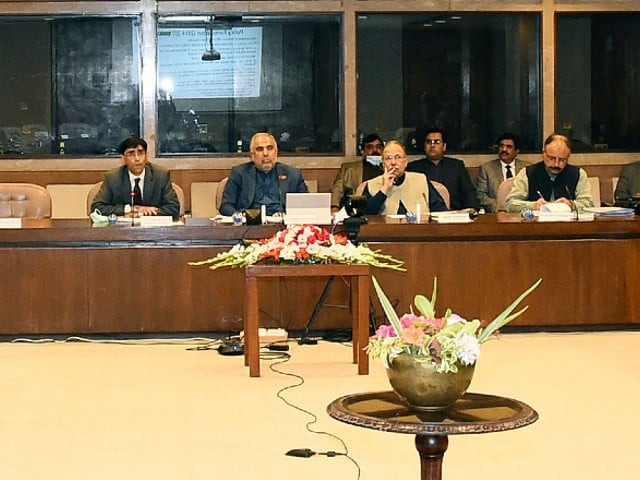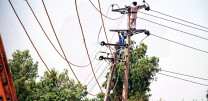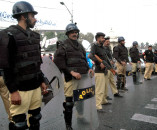NSA presents country's first-ever national security policy draft
Moeed tells lawmakers that the draft outlines challenges and opportunities facing Pakistan in coming years

The National Security Advisor (NSA) Dr Moeed Yusuf presented on Monday the first-ever draft of the national security policy before the Parliamentary Committee on National Security amid opposition parties’ boycott of the meeting.
The NSA, while putting the economic and military security at the core of policy, told the lawmakers that the draft outlines the challenges and opportunities facing Pakistan in coming years and would provide policy guidelines for mitigation and actualising opportunities through a “whole-of-government approach”.
Surprisingly, the NSA revealed, the draft was a result of the consultations with the stakeholders for the last seven years, adding it could be reviewed each year to keep it abreast with policy priorities in a fast changing global environment.
Read more: Economy, national security inter-linked: NSA
The attendees revealed that the NSA shed light on country’s economy, food, military and water security as well as discussed population growth, terrorism and foreign policy, especially, regarding Kashmir and Afghan issues and relations with other countries in the region and beyond.
Though the opposition boycotted the briefing, the conspicuous absence of Prime Minister Imran Khan, key federal ministers, MNAs and Senators was noticed as, unlike previous NSC meetings, only a handful of the lawmakers were present in the briefing.
Despite the low attendance, there was no dearth of heated arguments as well as some of the participants calling the briefing “superficial” and a collection of all the things that they usually hear and discuss at different forums. For some others, however, it was the whole purpose of the meeting as the national security policy was being codified for the first time in the last 70 years.
Also read: Moeed Yusuf’s civilian coup on national security
Officials who attended the meeting revealed that Senator Anwarul Haq Kakar and Federal Minister for Human Rights, Shireen Mazari, had a heated argument during the briefing when the human rights minister brought up the issue of enforced disappearance and started asking questions from NSA.
“You should ask questions about enforced disappearance in the federal cabinet meetings,” Senator Kakar said, “if you are a champion of enforced disappearances issue then why don’t you resign over the dismal situation; why no one speaks about the terrorism of BLA; why no one talks about the people who disappeared during MQM’s rule.”
Officials, requesting not to be named, said that MQM lawmakers also took exception to the comments passed by Kakar. However, as Kakar rose up from his chair, Speaker National Assembly Asad Qaiser intervened and persuaded him to stay in the meeting. Following the meeting, Kakar, while appreciating the government and NSA’s efforts of finally preparing a policy document dealing with the national security issue, said that the policy would be crucial as people would be able to refer to something after seven decades.
Read: Despite Opposition boycott, security briefing on Dec 6
GDA’s MNA Saira Bano appeared to be unsatisfied with the briefing as she equated the policy with the kind of precautions and instructions that people usually give, especially, before they "go to bed".
“Lock the doors, switch off the lights, turn off the heater and its valve, cover the water and food, don’t touch electric wires and keep the medicines away from the children.”
During the briefing, Moeed briefed the parliamentarians sans opposition members the details of the policy. He explained that the policy was designed to leverage the symbiotic relationship between human security, economic security and military security with the prosperity and safety of citizens as its principal focus.
The NSA said that it endeavours to put economic security at the core of policy priorities to expand the national resource pie for greater investments in human and military security.
He said that the process of consultations with stakeholders for the formulation of the National Security Policy was initiated in 2014 after the establishment of the National Security Division.
In the year 2018, he said, a drafting committee was established which built on earlier work, adding that several rounds of feedback consultations on multiple drafts were held with all state institutions, including provincial government and the governments of Gilgit-Baltistan and Azad Jammu and Kashmir. This was followed by consultations with over 600 academics, analysts, civil society members and students across Pakistan to make the policy process inclusive, he added.
Moeed informed the committee that “the policy is expected to be a dynamic document which will be reviewed each year and on the transition of government to help keep the National Security Policy abreast with policy priorities in a fast changing global environment.” Concluding the briefing, he said, the policy would outline the challenges and opportunities and provide policy guidelines.
On the occasion, the speaker said that the formulation of a comprehensive National Security Policy by the incumbent government reflected its priority for realising the dream of a secure and prosperous country.
The official statement stated that the participants of the meeting endorsed the National Security Division’s efforts and expressed their optimism that the policy would lead to an even more secure and prosperous Pakistan as the country was presently facing external as well as internal challenges.
It said that the meeting was attended by federal ministers, leader of the house in Senate, MNAs & Senators and the officers of the national security, defence, foreign affairs and interior divisions.
As per the revised notice issued in continuation of November 30 notification, NA Speaker had summoned the meeting to discuss the security situation in the country and the region. Upon opposition parties’ boycott, the government urged them to review their decision.



















COMMENTS
Comments are moderated and generally will be posted if they are on-topic and not abusive.
For more information, please see our Comments FAQ